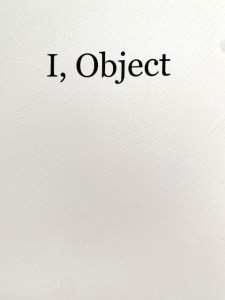A mechanic in one of Eliot Pattison’s Inspector Shan novels, set in Tibet, sees his job as facilitating the reincarnation of motor vehicles, patching them into their next incarnations. Stella Chrysostomou similarly gives life to jewellery objects in I, Object, giving them a voice to tell us of their lives and their aspirations – “I wanted to be loved forever.”
The selection of objects is inclusive, from unique gems to rank-and-file links, from rare pearls to humble clasps. We read of their adventures, triumphs, and joy, but also of the boredom of days spent in: “So many darks” – the dark of boxes, of velvet bags, of pockets, and of dirt. There are love affairs between objects and their makers and bearers, but also the heartbreak of rejection and discarding, “to land unnoticed on wooden floors, on linoleum, on the outdoors of your childhood”.
The avarice of humans is throughout the book, the acquisitiveness, the greed in their eyes; “Apparently, I am worth something.” There is a string of heists woven through the stories, based on real events, where jewels are grabbed and fenced by differing methods. In contrast to human randomness are the earnest pieces, “We are honest workers”. They are always trying hard, although perhaps occasionally considering rebellion, like the clasp who wonders about “Just letting go”.
The pieces relate to each other, they have hierarchies and loyalties, and are also aware that other might “tarnish your reputation”. They know the agony of creation; the tumbling, cleaving, and sanding required in the hopes of not being cast aside, of being able to say: “We had made the grade”. There is the loneliness of your fellow earring being out of sight. The resentment when further charms are added to a bracelet. The occasional weariness of being a symbol, “I get tired of holding my arms out all day”.
I, Object makes the reader, if a jewellery-wearer, aware of their own un-worn treasures. I often think of two anniversary pieces long lost, but this book made me think of the losses from their point of view – one ring lying hidden in the dirt of a property in Rarangi, the other wedged somewhere in between the bleachers of the Richmond Aquatic Centre.
The stories are varied, some even in verse, and the book has extensive explanatory notes. There are tales in the style of Melville, Dickens, and Dostoevsky – “If only he hadn’t lost at the card table”. The collection is whimsical and delightful, the objects in the stories often “the only spark of brightness”. As well as uniqueness and life-long relationships, it evokes mass production and often soul-less consumerism “how would you like it if you were just treated like a thing? An object”.

